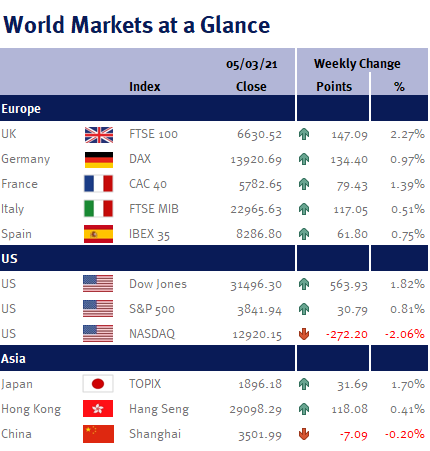It has been a rollercoaster week for equity markets.
On Wednesday (3 March 2021), Rishi Sunak presented his Budget Statement (our Budget market reaction can be found here), where he successfully managed to balance the need to reduce the UK’s world war level of government borrowing, while supporting the economic recovery by not tightening the purse strings.
However, it wasn’t the UK budget that moved equity markets this week: it was a mix of US economic data and comments from the Fed chair, Jay Powell.
Given (like everyone else around the world) we are like a coiled spring, just waiting for lockdown restrictions to be lifted, which will enable us to meet up with friends, go shopping and have a meal out in a restaurant, there has been a lot of talk recently that this, coupled with US fiscal stimulus, will result in inflationary pressures.
These inflationary pressures were given an unexpected boost this week when OPEC members decided to keep their reduced oil production levels unchanged. As a result, the price of a barrel of Brent crude ended the week $5 higher, at just shy of $70. Over the past 12 months this has averaged around $42.
Obviously, this higher oil price is inflationary. Not only will we all see it when we visit the petrol station to fill up our cars, but more importantly oil accounts for a large proportion of the total cost to produce all sorts of everyday products from plastics, household products and clothes, not to mention the energy to produce food (fuel, electricity, fertiliser and pesticides) and metals (energy accounts for a large percentage of a mine’s operating cost and, for example, the production of aluminium).
However, for inflation expectations to become unanchored, it requires us to respond and act on the assumption that we are in a period of sustained high inflation – and we don’t believe that this will be the case.
Yes, the global economy will recover strongly over the next year or so as lockdown restrictions are eased and normality returns to our lives, but the forces for low/no inflation in the medium-term remain in place as automation continues apace, which reduces prices and the bargaining power of employees (and little or no wage growth means no price pressures).
However, as we have previously stated, while we expect the headline inflation to rise sharply in the coming months thanks to the distorted oil price, it is only a transient pressure – and as such we don’t expect to see a sustained above target 2% inflation rate.
In fact the price of oil is now actually only back to its January 2020 pre-coronavirus outbreak level.
Equity market sentiment was also helped by Jay Powell who reiterated that the US central bank has no plans to raise interest rates anytime soon, despite the fact that this week’s US employment data showed 379,000 jobs were added in February, which reduced the unemployment rate to 6.2%. This is because the Fed is looking at the underlying data rather than the headline number and the broader U-6 data (which includes those working part-time, but want full-time employment; and those Americans that want to work, but haven’t looked in the past 4 weeks as they don’t believe there are any jobs available for them) remains stubbornly high at 11.1%.
Looking ahead at this coming week, we have UK industrial and manufacturing production; UK GDP for January; US & Chinese CPI inflation; US weekly jobless claims; the University of Michigan consumer sentiment index; and an ECB monetary policy meeting.
Investment Management Team


